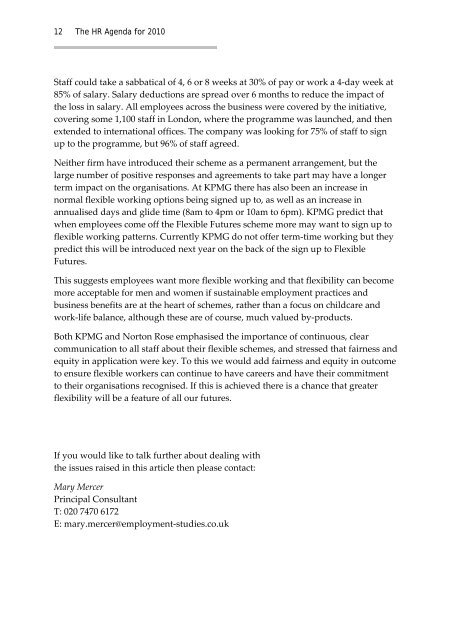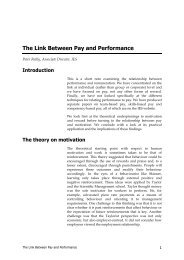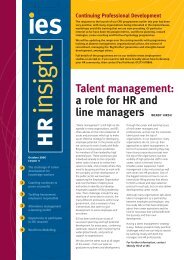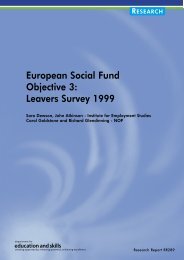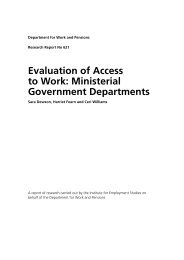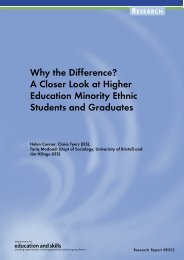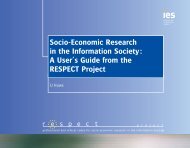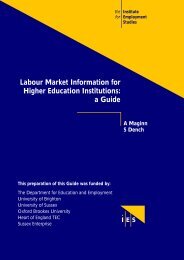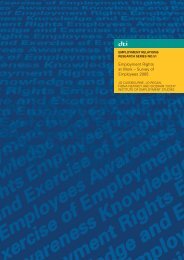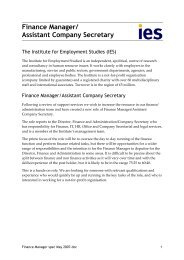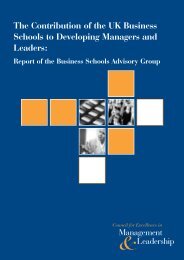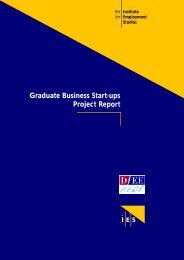PDF of this item - The Institute for Employment Studies
PDF of this item - The Institute for Employment Studies
PDF of this item - The Institute for Employment Studies
- No tags were found...
You also want an ePaper? Increase the reach of your titles
YUMPU automatically turns print PDFs into web optimized ePapers that Google loves.
12 <strong>The</strong> HR Agenda <strong>for</strong> 2010Staff could take a sabbatical <strong>of</strong> 4, 6 or 8 weeks at 30% <strong>of</strong> pay or work a 4‐day week at85% <strong>of</strong> salary. Salary deductions are spread over 6 months to reduce the impact <strong>of</strong>the loss in salary. All employees across the business were covered by the initiative,covering some 1,100 staff in London, where the programme was launched, and thenextended to international <strong>of</strong>fices. <strong>The</strong> company was looking <strong>for</strong> 75% <strong>of</strong> staff to signup to the programme, but 96% <strong>of</strong> staff agreed.Neither firm have introduced their scheme as a permanent arrangement, but thelarge number <strong>of</strong> positive responses and agreements to take part may have a longerterm impact on the organisations. At KPMG there has also been an increase innormal flexible working options being signed up to, as well as an increase inannualised days and glide time (8am to 4pm or 10am to 6pm). KPMG predict thatwhen employees come <strong>of</strong>f the Flexible Futures scheme more may want to sign up t<strong>of</strong>lexible working patterns. Currently KPMG do not <strong>of</strong>fer term‐time working but theypredict <strong>this</strong> will be introduced next year on the back <strong>of</strong> the sign up to FlexibleFutures.This suggests employees want more flexible working and that flexibility can becomemore acceptable <strong>for</strong> men and women if sustainable employment practices andbusiness benefits are at the heart <strong>of</strong> schemes, rather than a focus on childcare andwork‐life balance, although these are <strong>of</strong> course, much valued by‐products.Both KPMG and Norton Rose emphasised the importance <strong>of</strong> continuous, clearcommunication to all staff about their flexible schemes, and stressed that fairness andequity in application were key. To <strong>this</strong> we would add fairness and equity in outcometo ensure flexible workers can continue to have careers and have their commitmentto their organisations recognised. If <strong>this</strong> is achieved there is a chance that greaterflexibility will be a feature <strong>of</strong> all our futures.If you would like to talk further about dealing withthe issues raised in <strong>this</strong> article then please contact:Mary MercerPrincipal ConsultantT: 020 7470 6172E: mary.mercer@employment‐studies.co.uk


